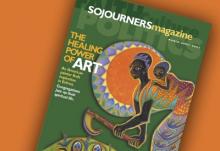Music
The distinctive sound of Ladysmith Black Mambazo is one of the finest expressions of African music.
Gathered from various concert performances over the past decade, Don't Talk About Love—a 16-track album that spans a decade of Martyn Joseph's work—plays like
An interview with music-maker, activist, and passionate believer Michelle Shocked.
The first time I played Waterdeep's new album for my housemates, they were up and dancing within seconds.
More than 30 years into his career, nine Grammys, and dozens of tours, 55-year-old Carlos Santana's music continues to evolve, and he's bringing another generation along for the ride.
Since Sept. 11, country music stations have blared songs like Lee Greenwood's "God Bless the U.S.A." and Aaron Tippin's "Where the Stars and Stripes and the Eagle Fly"

Imagine a packed elementary school auditorium and only an hour between hundreds of kids and summer vacation. "Peace" isn't the word that comes to mind.
That sentence is the title of historian Bill Malone's new book about country music (the subtitle is Country Music and the Southern Working Class). Before that, in 1981, it was the title of a hit record by country music neo-traditionalist Ricky Skaggs. In 1951, it was recorded by Lester Flatt and Earl Scruggs. But long before any of this, it was (and still is) a common piece of folk wisdom among lower-class white people, especially in the South.
For many people of other regions or social classes, the saying may sound odd, counter-intuitive, and even un-American. In America, we're often told that "getting above your raisin'"—transcending the circumstances of birth—is the main point of existence. If Abe Lincoln had stayed in the log cabin, who would care? If Elvis had become a sincere but flat-broke folk singer, we wouldn't know his name. Americans don't buy stories about virtuous poor boys who stay poor, and we're offended at the suggestion that there might be something wrong with individual self-realization. The impulse to rise above our origins is buried deep in our national DNA. Immigrants have always come here to escape poverty and persecution and become rich and powerful. The right to perpetual self-invention might as well be enshrined in the Constitution.
The heretical wisdom embodied in "Don't get above your raisin'" suggests that roots, family, communal identity, and solidarity are all more important than individual striving or success. This is a way of thinking that most American intellectuals would associate with "traditional" or "pre-modern" cultures. But Malone, a professor emeritus in history from Tulane University, is also a good old boy from East Texas who knows that the preference for group loyalty and solidarity has lived on in modern America among rural people and blue-collar workers. In Don't Get Above Your Raisin', he argues persuasively that, in the last half of the 20th century, country music, which expressed the daily concerns of white Southern working people, broke out of the Southern region to become the cultural voice of America's white working class.
Friends, this song is called "I Heard an Owl," and it was written two days after the Sept. 11 tragedy.

A national study documents what many congregations already knew—that the arts are good for faith, and faith can be good for the arts.